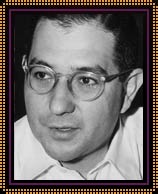 While still attending school Rome played piano in local dance bands and was already writing music. Despite this early interest in music, he went on to study architecture and law at Yale. In 1934 he practiced as an architect in New York City, but studied piano and composition in his spare time. This was a fortunate decision because by the following year, with work opportunities diminishing with the depression, he was obliged to turn more and more to his second-string activity for support. Much of the music Rome was writing at this time was socially conscious and was thus of little interest to Tin Pan Alley. Nevertheless, he was engaged to write a revue for the International Garment Workers’ Union. To everyone’s surprise, the revue, “Pins and Needles” (1937), staged for members of the union, became a popular success and one song, “Sunday in the Park,” established a life outside of the show. Rome was now much sought-after, although his next show displayed similarly political concerns.
While still attending school Rome played piano in local dance bands and was already writing music. Despite this early interest in music, he went on to study architecture and law at Yale. In 1934 he practiced as an architect in New York City, but studied piano and composition in his spare time. This was a fortunate decision because by the following year, with work opportunities diminishing with the depression, he was obliged to turn more and more to his second-string activity for support. Much of the music Rome was writing at this time was socially conscious and was thus of little interest to Tin Pan Alley. Nevertheless, he was engaged to write a revue for the International Garment Workers’ Union. To everyone’s surprise, the revue, “Pins and Needles” (1937), staged for members of the union, became a popular success and one song, “Sunday in the Park,” established a life outside of the show. Rome was now much sought-after, although his next show displayed similarly political concerns.
Harold Rome
- "Call Me Mister"
- "Destry Rides Again"
- "Fanny"
- "Pins and Needles"
- "Wish You Were Here"
- Michael Kidd
- Joshua Logan
- David Merrick
- Barbra Streisand
This was “Sing out the News” (1939) and, once again, there was a universally accepted hit song, “F.D.R. Jones.” In the early ’40s Rome wrote songs for several revues and shows, but it was not until after the end of World War II that he had his first major success. This was “Call Me Mister” (1946), from which came “South America, Take It Away.” More revues followed until his first fully fledged musical show, “Wish You Were Here,” in 1952. Two years later he wrote “Fanny,” his most popular Broadway show, which included “Love Is a Very Light Thing.” This was followed by “Destry Rides Again” (1959) and “I Can Get It for You Wholesale” (1962), in which Barbra Streisand made her Broadway debut. In the mid-’60s Rome showed that the social conscience that had marked his early work was still intact when he wrote “The Zulu and the Zayda” (1965), which dealt with racial and religious intolerance. In 1970 he wrote “Scarlett,” based upon the novel GONE WITH THE WIND, for a Japanese production in Tokyo. More than with any other American composer in the field of mainstream popular music, Rome’s work consistently demonstrated an awareness of social issues, often to the extent that it kept him from the massive successes enjoyed by many of his contemporaries. He was also a gifted painter and a dedicated art collector.
Source: Biographical information provided by MUZE. Excerpted from the ENCYCLOPEDIA OF POPULAR MUSIC, edited by Colin Larkin. © 2004 MUZE UK Ltd.
Photo credits: Photofest

